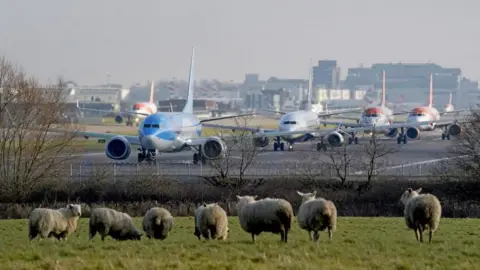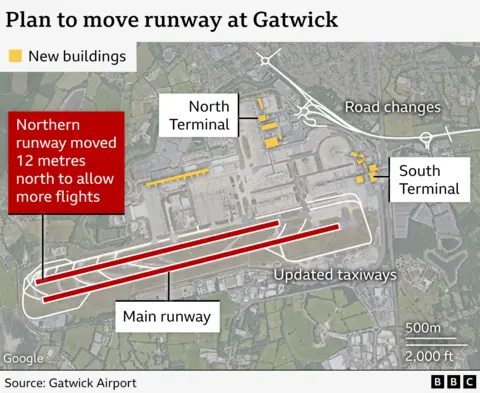Katy Austintransport correspondent and
Jamie Whitehead
 PA Media
PA MediaTransport Secretary Heidi Alexander has approved plans for a second runway at London Gatwick Airport, as the government looks for economic growth opportunities.
The £2.2bn privately-financed project involves in effect moving the current Northern Runway 12 metres to bring it into regular use, as well as other developments, including extending the size of terminals.
Chancellor Rachel Reeves said the plans would create “thousands of jobs and billions in investment”, but the project has faced opposition and the Green Party described it as a “disaster”.
Gatwick currently handles about 280,000 flights a year. It says the plan would allow that number to rise to around 389,000 by the late 2030s.
Reeves said the second Gatwick runway was part of the government’s plan to “get Britain building again”.
Speaking at the airport, the chancellor said: “This extra runway at Gatwick will mean that people going on holiday will have a greater choice of destinations, it will mean lower costs for a family holiday.
“It will also mean more good jobs paying decent wages through this injection of cash into our economy.”
A government source has described the plans as a “no-brainer for growth,” adding that “it is possible that planes could be taking off from a new full runway at Gatwick before the next general election”, which would mean by 2029.
But Green Party leader Zack Polanski said the project “ignores basic climate science and risks undermining efforts to tackle the climate crisis”.
“Labour keeps wheeling out the same nonsense about growth, but at what cost?” he said.
London Gatwick, in West Sussex, is Europe’s busiest single-runway airport with more than 40 million passengers using it every year.
The plans approved by Alexander would include adding 40,000 more flights before the second runway opens, and 70,000 more – almost 190 a day – once it is fully up and running.
The airport says that passenger numbers could rise to up to 80 million.
At the moment the Northern Runway is only used for taxiing or as a back-up.
The second runway would be used for short-haul flights, with capacity also freed up for more long-haul services from the main runway.

The decision to approve the expansion plan had been expected in February, but at the time, the transport secretary only said she was “minded to grant consent” for the Northern Runway planning application.
It emerged planning inspectors had expressed concerns over the effect the proposals would have on several aspects on the area surrounding the airport, including traffic and noise.
In April, Gatwick Airport agreed to stricter noise controls, an enhanced insulation scheme for nearby residents, and having 54% of air passengers using public transport before the Northern Runway opened.
Under the new terms of the Gatwick expansion, if the target for passengers travelling by public transport is not met, then the number of passenger trips to the airport by road must be below 24 million a year.
“We will work very closely with government… to boost the number of people getting to Gatwick by public transport, particularly by rail,” said Stewart Wingate, managing director of UK Airports, which owns Gatwick.
Before the Covid-19 pandemic, the Gatwick Express ran a service of four trains per hour non-stop between the airport and London Victoria, this was reduced to two trains per hour from 2022.
“Today we have a train once every four minutes in the direction of London. Before the pandemic it was one every three minutes. They’re the sorts of areas that we’ll be focusing on working on with government,” Mr Wingate said.
The new plans also stipulate that residents affected by more noise can ask Gatwick to cover the costs for triple-glazed windows at their property.
New conditions also include the airport paying stamp duty and some moving costs for the most affected homeowners if they choose to sell up.
“We are happy to take those additional costs on the noise mitigation measures,” Mr Wingate said.
Shadow transport secretary Richard Holden welcomed the decision as “a vital step towards driving economic growth”.
But he said approval should have been made months ago and accused Labour of creating “uncertainty for businesses and local communities”.
Liberal Democrat leader Sir Ed Davey told BBC 5 Live he did not like the way “communities are just ignored”, and said there were “huge health and environmental concerns” linked to the airport’s expansion.
He added he wanted to see “massive investment” into “clean flight” technology.
“If we get clean aviation, where the noise emissions are cut and the other toxic emissions are cut for our climate, for local people’s health, then of course it could go ahead, I’m not against aviation,” he said.
The government source said: “Any airport expansion must be delivered in line with our legally binding climate change commitments and meet strict environmental requirements.”
But environmental groups hit out at the decision. Greenpeace UK’s policy director Doug Parr said it “smacks of desperation, completely ignoring the solid evidence that increasing air travel won’t drive economic growth”.
“The only thing it’s set to boost is air pollution, noise and climate emissions,” he added.
Hannah Lawrence, spokesperson for Stay Grounded, said: “We need an immediate end to airport expansion and money put into improving sustainable transport such as trains.”
 BBC News
BBC NewsSally Pavey, chair of Communities Against Gatwick Noise Emissions (CAGNE), told BBC Radio Surrey that a second runway was “a cocktail of a nightmare” and would like to see a judicial review.
“We can’t believe the government has not held Gatwick accountable and said ‘pay for the infrastructure if you want this new runway’,” she said.
“There are so many holes, so many reasons to serve a judicial review.”
But Brett North, chief executive of the Gatwick Diamond Initiative, which promotes businesses in the area, said: “It’s not just about a runway. It’s about the things that come with that runway, the new jobs that come with a billion pounds worth of investment of growth in the economy.”
Gatwick’s is the latest in a string of UK airport expansion approvals, most recently Luton’s in April.
The government has also expressed support for a third runway at the country’s biggest airport, Heathrow, but that would be a much more complex, costly and controversial project.
The proposed expansion of Gatwick has been assessed as unlikely to affect the hub status of Heathrow in the long term.




